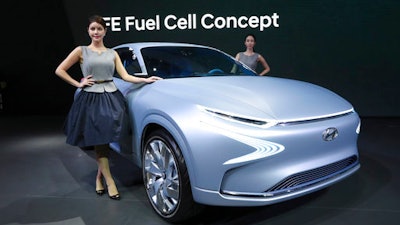
GOYANG, South Korea (AP) — South Korea's largest auto show provides a look at the future of Asian premium cars and electric vehicles, as well as efforts by Asian auto and tech companies to catch up in the field of autonomous driving (view photos in gallery).
The biennial Seoul Motor Show opens Friday in Goyang, north of Seoul, for a 10-day run. There are 243 vehicles on display. Two are making their world premieres: Hyundai Motor's Grandeur hybrid electric vehicle and Ssangyong Motor's G4 Rexton sports utility vehicle. Eighteen others are making their Asian debuts.
Although usually smaller than auto shows in Frankfurt, Detroit or Shanghai, the Seoul Motor Show is nonetheless a place to read auto trends and consumer tastes among trend-setting, tech-savvy consumers in the world's most populous continent.
This year's highlight is Kia Motor's first luxury sports sedan, Stinger, which launches a new era for premium sports cars built in South Korea, home to the world's fifth-largest automotive group. Growing interest in environmentally friendly cars among South Koreans will be in the spotlight as well.
The show is missing Volkswagen and Audi, after South Korea halted sales last summer of dozens of their diesel car models for using software to cheat emission tests.
Here are some highlights of the show.
Kia Stinger
The star of the show is the Stinger, Kia's five-passenger sports sedan. It is Kia's first premium sports car and the first fastback sedan made by any South Korean carmaker. Many see the Stinger as a game changer for Kia, which is seeking to challenge European sports cars and expand in Western markets.
Designed in Frankfurt, the rear-wheel-drive sedan is based on its GT concept in 2011. Kia is displaying the Stinger at a booth near Ferrari and Maserati, an expression of the youthful car maker's self-confidence. Of the three Stinger lines, the top tier employs a turbocharged 3.3 liter engine that produces 370 horsepower with a 0-to-62 mph speed of 4.9 seconds.
The Stinger goes on sale in South Korea in the spring and will be released overseas during the second half of the year. Pricing hasn't been announced. Kia plans another premium sedan early next year, a large-size sedan.
Hyundai
Hyundai Motor is putting its electric vehicles at the forefront. It is revealing the hybrid electric version of its steady-selling Grandeur sedan which boasts a claimed fuel efficiency of 16.2 kilometers per liter (38.2 miles per gallon).
It also is giving a first look at a fuel cell concept car. Hyundai plans to release its second-generation fuel cell electric vehicle early next year.
An executive demonstrated how in the future humans will be able to speak to a device to summon a driverless car to one's door. In 2019, Hyundai, South Korea's largest automaker, plans cars that will allow drivers to remotely turn on the lights or set the temperature inside a house.
Mapping Robots & Self Driving
Naver, the parent company of mobile messaging service Line, is investing in autonomous driving technology and says it will use data acquired from it to tackle everyday questions such as the location of the nearest parking spot.
"We are not doing it for cars or auto technology," Naver Labs CEO Song Chang-hyun said. The company, which operates the most-visited web portal in South Korea, one of the few countries in the world not conquered by Google, said its self-driving cars are navigating roads to gain more data on buildings, streets, traffic and parking so it can make its maps more sophisticated and help people determine things like the location of the least-crowded nearby cafe, or when to take the least crowded bus during a morning commute.
Naver also is demonstrating its M1 robot, which can move around areas that are too small for self-driving cars. The M1, about half the size of a human, can even navigate through the rows of bookshelves in a library.
Ssangyong's New Car
South Korea's smallest carmaker, Ssangyong Motor, is unveiling its second new car since its 2011 tie-up with India's Mahindra Group. The G4 Rexton, a large sports utility vehicle, is Ssangyong's new flagship product since its mini SUV Tivoli put the once-deeply ailing carmaker onto a path to recovery.
Thanks to the popularity of the Tivoli and rising demand for sports utility vehicles, Ssangyong posted its first annual income in nine years in 2016. Details about engines, pricing and sales were not announced.
Electric Vehicles
About one fifth of the vehicles on display are electric, a sign that automakers are responding to the South Korean government's push for more electric vehicles. South Korea plans to increase the proportion of environmentally friendly vehicles in the domestic market to 20 percent by 2020 from just 2 percent in 2015.
If it achieves that goal, more than 1 million electric vehicles will be sold in the country by 2020. Jaguar, Honda, Lexus, Toyota and Mercedes-Benz are using the Seoul Motor Show to show their existing electric vehicles, while Hyundai, Kia and Genesis are presenting their plans for plug-in models, fuel cells and hybrid cars.






















